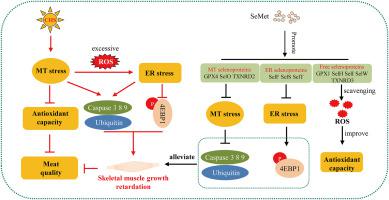当前位置:
X-MOL 学术
›
Anim. Nutr.
›
论文详情
Our official English website, www.x-mol.net, welcomes your feedback! (Note: you will need to create a separate account there.)
Selenomethionine alleviates chronic heat stress-induced breast muscle injury and poor meat quality in broilers via relieving mitochondrial dysfunction and endoplasmic reticulum stress
Animal Nutrition ( IF 6.3 ) Pub Date : 2024-02-01 , DOI: 10.1016/j.aninu.2023.12.008 Jinzhong Jing , Jiayi Wang , Xiaoyu Xiang , Shenggang Yin , Jiayong Tang , Longqiong Wang , Gang Jia , Guangmang Liu , Xiaoling Chen , Gang Tian , Jingyi Cai , Bo Kang , Lianqiang Che , Hua Zhao
Animal Nutrition ( IF 6.3 ) Pub Date : 2024-02-01 , DOI: 10.1016/j.aninu.2023.12.008 Jinzhong Jing , Jiayi Wang , Xiaoyu Xiang , Shenggang Yin , Jiayong Tang , Longqiong Wang , Gang Jia , Guangmang Liu , Xiaoling Chen , Gang Tian , Jingyi Cai , Bo Kang , Lianqiang Che , Hua Zhao

|
In the present study, the chronic heat stress (CHS) broiler model was developed to investigate the potential protection mechanism of organic selenium (selenomethionine, SeMet) on CHS-induced skeletal muscle growth retardation and poor meat quality. Four hundred Arbor Acres male broilers (680 ± 70 g, 21 d old) were grouped into 5 treatments with 8 replicates of 10 broilers per replicate. Broilers in the control group were raised in a thermoneutral environment (22 ± 2 °C) and fed with a basal diet. The other four treatments were exposed to hyperthermic conditions (33 ± 2 °C, 24 h in each day) and fed on the basal diet supplied with SeMet at 0.0, 0.2, 0.4, and 0.6 mg Se/kg, respectively, for 21 d. Results showed that CHS reduced ( 0.05) the growth performance, decreased ( 0.05) the breast muscle weight and impaired the meat quality of breast muscle in broilers. CHS induced protein metabolic disorder in breast muscle, which increased ( 0.05) the expression of caspase 3, caspase 8, caspase 9 and ubiquitin proteasome system related genes, while decreased the protein expression of P-4EBP1. CHS also decreased the antioxidant capacity and induced mitochondrial stress and endoplasmic reticulum (ER) stress in breast muscle, which increased ( 0.05) the ROS levels, decreased the concentration of ATP, increased the protein expression of HSP60 and CLPX, and increased ( 0.05) the expression of ER stress biomarkers. Dietary SeMet supplementation linearly increased ( 0.05) breast muscle Se concentration and exhibited protective effects via up-regulating the expression of the selenotranscriptome and several key selenoproteins, which increased ( < 0.05) body weight, improved meat quality, enhanced antioxidant capacity and mitigated mitochondrial stress and ER stress. What's more, SeMet suppressed protein degradation and improved protein biosynthesis though inhibiting the caspase and ubiquitin proteasome system and promoting the mTOR-4EBP1 pathway. In conclusion, dietary SeMet supplementation increases the expression of several key selenoproteins, alleviates mitochondrial dysfunction and ER stress, improves protein biosynthesis, suppresses protein degradation, thus increases the body weight and improves meat quality of broilers exposed to CHS.
中文翻译:

硒代蛋氨酸通过缓解线粒体功能障碍和内质网应激,减轻慢性热应激引起的肉鸡胸肌损伤和肉质不良
在本研究中,建立了慢性热应激(CHS)肉鸡模型,以研究有机硒(硒代蛋氨酸,SeMet)对CHS引起的骨骼肌生长迟缓和肉品质差的潜在保护机制。将 400 只 Arbor Acres 雄性肉鸡(680 ± 70 g,21 日龄)分为 5 个处理,每个重复 10 只肉鸡,共 8 个重复。对照组肉鸡在中性环境(22±2°C)中饲养并饲喂基础日粮。其他四种处理暴露在高温条件下(33±2℃,每天24小时),并分别以添加SeMet(0.0、0.2、0.4和0.6mg Se/kg)的基础日粮喂养,持续21天。 。结果表明,CHS降低了肉鸡的生长性能(0.05),降低了胸肌重量(0.05),并损害了肉鸡胸肌的肉质。 CHS引起胸肌蛋白质代谢紊乱,导致caspase 3、caspase 8、caspase 9及泛素蛋白酶体系统相关基因表达增加(0.05),而P-4EBP1蛋白表达减少。 CHS还降低了胸肌的抗氧化能力,诱导线粒体应激和内质网(ER)应激,从而增加(0.05)ROS水平,降低ATP浓度,增加HSP60和CLPX蛋白表达,增加(0.05) ER应激生物标志物的表达。膳食补充 SeMet 线性增加 ( 0.05) 胸肌硒浓度,并通过上调硒转录组和几种关键硒蛋白的表达表现出保护作用,从而增加 ( < 0.05) 体重,改善肉质,增强抗氧化能力并减轻线粒体应激和 ER 压力。此外,SeMet 通过抑制 caspase 和泛素蛋白酶体系统并促进 mTOR-4EBP1 通路来抑制蛋白质降解并改善蛋白质生物合成。总之,日粮中添加 SeMet 可增加几种关键硒蛋白的表达,缓解线粒体功能障碍和 ER 应激,改善蛋白质生物合成,抑制蛋白质降解,从而增加暴露于 CHS 的肉鸡的体重并改善肉质。
更新日期:2024-02-01
中文翻译:

硒代蛋氨酸通过缓解线粒体功能障碍和内质网应激,减轻慢性热应激引起的肉鸡胸肌损伤和肉质不良
在本研究中,建立了慢性热应激(CHS)肉鸡模型,以研究有机硒(硒代蛋氨酸,SeMet)对CHS引起的骨骼肌生长迟缓和肉品质差的潜在保护机制。将 400 只 Arbor Acres 雄性肉鸡(680 ± 70 g,21 日龄)分为 5 个处理,每个重复 10 只肉鸡,共 8 个重复。对照组肉鸡在中性环境(22±2°C)中饲养并饲喂基础日粮。其他四种处理暴露在高温条件下(33±2℃,每天24小时),并分别以添加SeMet(0.0、0.2、0.4和0.6mg Se/kg)的基础日粮喂养,持续21天。 。结果表明,CHS降低了肉鸡的生长性能(0.05),降低了胸肌重量(0.05),并损害了肉鸡胸肌的肉质。 CHS引起胸肌蛋白质代谢紊乱,导致caspase 3、caspase 8、caspase 9及泛素蛋白酶体系统相关基因表达增加(0.05),而P-4EBP1蛋白表达减少。 CHS还降低了胸肌的抗氧化能力,诱导线粒体应激和内质网(ER)应激,从而增加(0.05)ROS水平,降低ATP浓度,增加HSP60和CLPX蛋白表达,增加(0.05) ER应激生物标志物的表达。膳食补充 SeMet 线性增加 ( 0.05) 胸肌硒浓度,并通过上调硒转录组和几种关键硒蛋白的表达表现出保护作用,从而增加 ( < 0.05) 体重,改善肉质,增强抗氧化能力并减轻线粒体应激和 ER 压力。此外,SeMet 通过抑制 caspase 和泛素蛋白酶体系统并促进 mTOR-4EBP1 通路来抑制蛋白质降解并改善蛋白质生物合成。总之,日粮中添加 SeMet 可增加几种关键硒蛋白的表达,缓解线粒体功能障碍和 ER 应激,改善蛋白质生物合成,抑制蛋白质降解,从而增加暴露于 CHS 的肉鸡的体重并改善肉质。



























 京公网安备 11010802027423号
京公网安备 11010802027423号